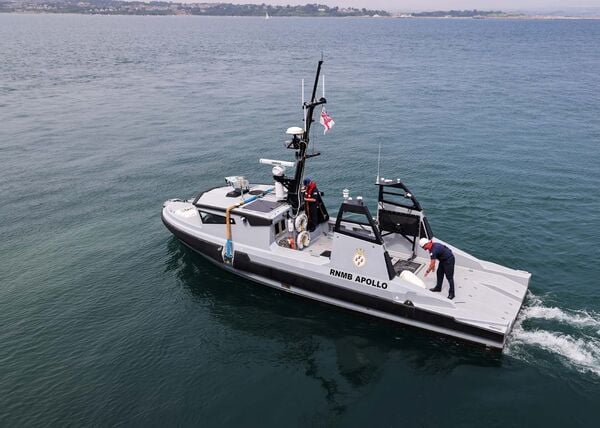
RNMB Apollo has recently completed a degree 3 autonomy serial. (Royal Navy/Stuart Dickson)
The UK Royal Navy's (RN's) unmanned surface vessel (USV) RNMB Apollo has successfully completed degree 3 autonomy trials, marking another milestone for the UK's Mine Hunting Capability (MHC) programme.
Degree 3 autonomy – also known as conditional autonomy – demonstrates that an autonomous system can perform most operational tasks independently under certain conditions.
During the recent trials, which were carried out by the RN's Maritime Autonomous Systems Trials Team (MASTT) in Weymouth Bay, Apollo successfully carried out a preprogrammed mission while being remotely controlled by a team from a shore-based station, the RN confirmed on 30 July. While conducting the mission the USV was able to demonstrate reliable path-planning and use the information it received to avoid potential hazards.
Building on this success, MASTT will now focus on further refining the system in preparation for an integration period later this year with the UK's new minehunting mother ship RFA Stirling Castle.
Apollo is a 12 m-long USV built by L3Harris under subcontract to Thales. It is one of the two pre-production USVs delivered by Thales to the RN and French Navy in December 2021 under the joint UK-French Maritime Mine Counter Measures (MMCM) programme for their respective MHC and Système de Lutte Anti-Mines Futur (SLAMF) mine countermeasure (MCM) recapitalisation programmes.
The USVs form part of a primary ‘system of systems' developed by Thales for both countries that use remote offboard systems (both autonomous underwater vehicles and USVs) to enable detection, classification, localisation, and neutralisation of mine threats at stand-off ranges.
Looking to read the full article?
Gain unlimited access to Janes news and more...







